部编版九年级英语Units 12-14复习课件(共18张ppt,无音频)
文档属性
| 名称 | 部编版九年级英语Units 12-14复习课件(共18张ppt,无音频) | 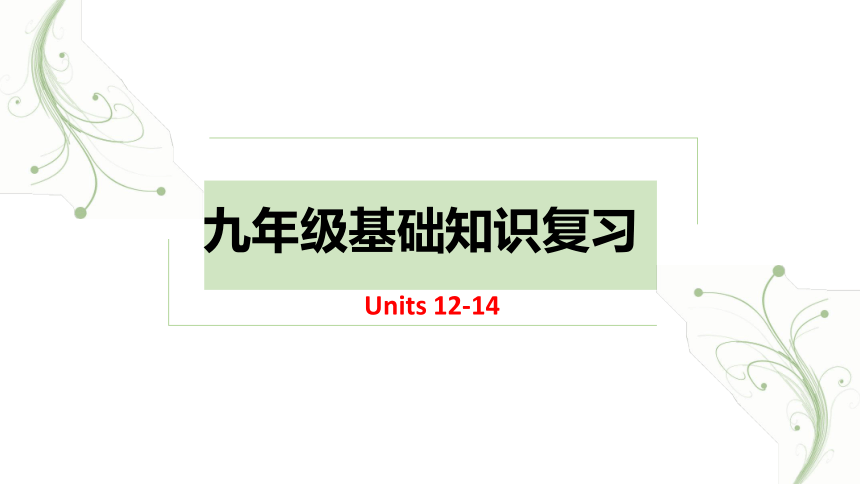 | |
| 格式 | zip | ||
| 文件大小 | 409.1KB | ||
| 资源类型 | 教案 | ||
| 版本资源 | 人教新目标(Go for it)版 | ||
| 科目 | 英语 | ||
| 更新时间 | 2020-03-29 10:07:41 | ||
图片预览

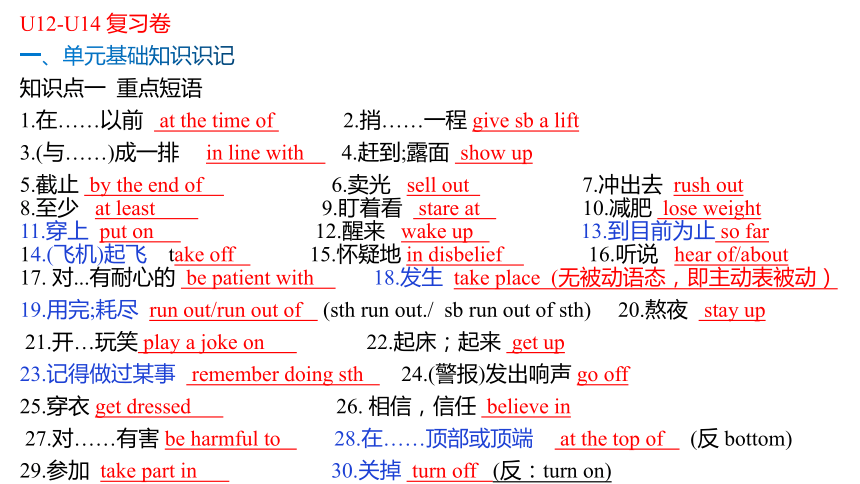


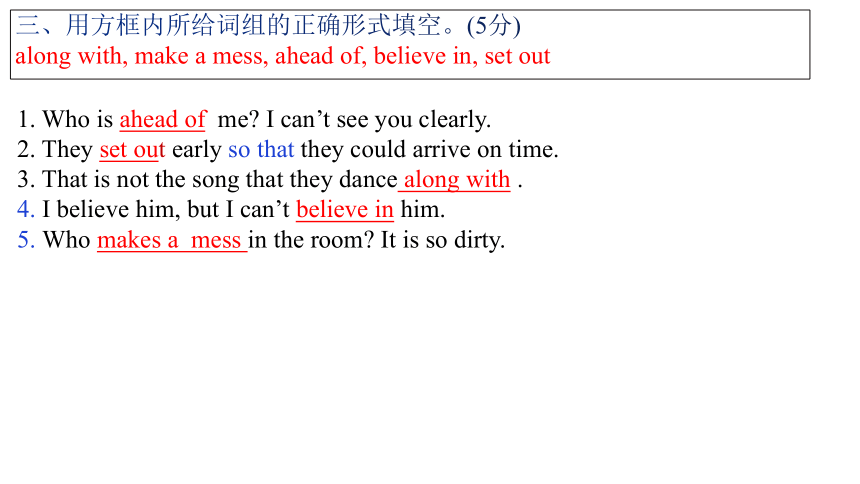
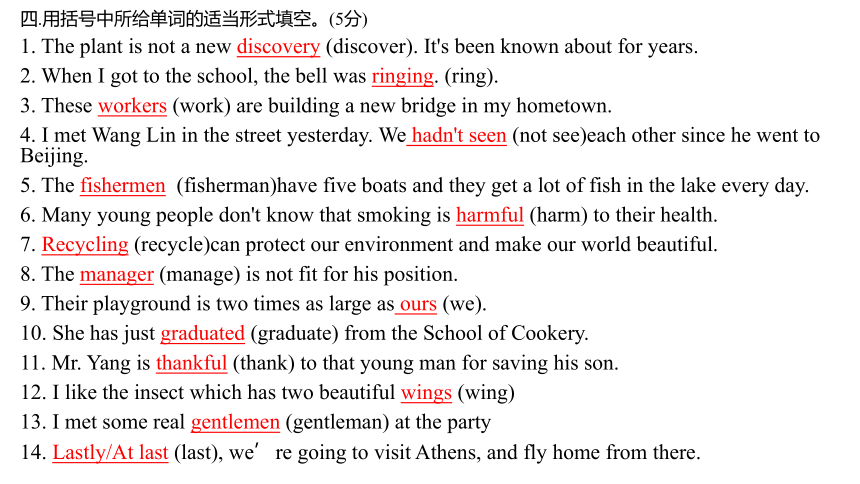
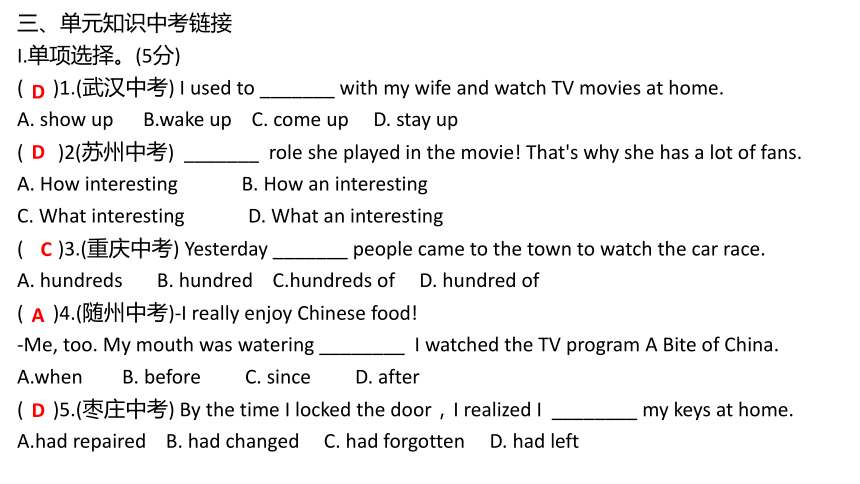
文档简介
课件18张PPT。九年级基础知识复习Units 12-14U12-U14 复习卷
一、单元基础知识识记
知识点一 重点短语
1.在……以前 at the time of 2.捎……一程 give sb a lift
3.(与……)成一排 in line with 4.赶到;露面 show up
5.截止 by the end of 6.卖光 sell out 7.冲出去 rush out 8.至少 at least 9.盯着看 stare at 10.减肥 lose weight 11.穿上 put on 12.醒来 wake up 13.到目前为止 so far 14.(飞机)起飞 take off 15.怀疑地 in disbelief 16.听说 hear of/about 17. 对...有耐心的 be patient with 18.发生 take place (无被动语态,即主动表被动)
19.用完;耗尽 run out/run out of (sth run out./ sb run out of sth) 20.熬夜 stay up
21.开…玩笑 play a joke on 22.起床;起来 get up
23.记得做过某事 remember doing sth 24.(警报)发出响声 go off
25.穿衣 get dressed 26. 相信,信任 believe in
27.对……有害 be harmful to 28.在……顶部或顶端 at the top of (反 bottom)
29.参加 take part in 30.关掉 turn off (反:turn on) 31.付费;付出代价 pay for 32.采取行动 take action
33.扔掉;抛弃 throw away 34.好好利用某物 put sth to good use
35.拆下;摧毁 pull down 36.回首,回顾 look back at
37.充满 be full of/be filled with 38. 参与/发挥作用做某事 play a role/part in
39.把……变成…… turn...into 40.减少,砍倒 cut down
41.代替 instead of 42.不再 not..any more/longer ; no more/longer
43.建立 set up 44.因为……而出名 be famous/known for
45.弄得一团糟 make a mess 46.由……制造 be made of/from
47.起作用;有影响 make a difference (to) 48.事实上 in fact
49.期盼做某事 look forward to doing 50. 首先 first of all 区别at first
51. 处理;应对 deal with 52. 渴望 be thirsty for
53. 沉住气;保持冷静 keep one's cool 54. 分离;隔开 seperate from
55. 负责任 be responsible for 56. 连续几次 in a row
57. 做某事有困难 have problems/trouble/difficulty(in) doing sth
58. (时间)消逝,逝去 go by 59. 为..做准备 prepare for 60. 出发,启程 set out 一、用方框内所给词组的正确形式填空。
be about to by accident plenty of in order to feel like
1.The Internet provides us with plenty of information which is used in many ways.
2. I really don't want to know your secret. I only found it by accident. .
3. If you're afraid of taking the lift or just feel like exercising, you can climb the stairs to go up.
4.I was about to leave when the telephone suddenly rang.
5. They are riding a bicycle around the island in order to experience as much of it as possible.
二、.用方框内所给词组的正确形式填空。
play a part used to pay for pull down throw away
1. Our river used to be clean but now it’s too dirty.
2. Everyone in our city should play a part in cleaning up the river.
3. The old buildings have been pulled down because of the earthquake.
4. Don’t throw away rubbish onto the ground.
5. You should pay for what you have done.三、用方框内所给词组的正确形式填空。(5分)
along with, make a mess, ahead of, believe in, set out1. Who is ahead of me? I can’t see you clearly.
2. They set out early so that they could arrive on time.
3. That is not the song that they dance along with .
4. I believe him, but I can’t believe in him.
5. Who makes a mess in the room? It is so dirty. 四.用括号中所给单词的适当形式填空。(5分)
1. The plant is not a new discovery (discover). It's been known about for years.
2. When I got to the school, the bell was ringing. (ring).
3. These workers (work) are building a new bridge in my hometown.
4. I met Wang Lin in the street yesterday. We hadn't seen (not see)each other since he went to Beijing.
5. The fishermen (fisherman)have five boats and they get a lot of fish in the lake every day.
6. Many young people don't know that smoking is harmful (harm) to their health.
7. Recycling (recycle)can protect our environment and make our world beautiful.
8. The manager (manage) is not fit for his position.
9. Their playground is two times as large as ours (we).
10. She has just graduated (graduate) from the School of Cookery.
11. Mr. Yang is thankful (thank) to that young man for saving his son.
12. I like the insect which has two beautiful wings (wing)
13. I met some real gentlemen (gentleman) at the party
14. Lastly/At last (last), we’re going to visit Athens, and fly home from there.三、单元知识中考链接
I.单项选择。(5分)
( )1.(武汉中考) I used to _______ with my wife and watch TV movies at home.
A. show up B.wake up C. come up D. stay up
( )2(苏州中考) _______ role she played in the movie! That's why she has a lot of fans.
A. How interesting B. How an interesting
C. What interesting D. What an interesting
( )3.(重庆中考) Yesterday _______ people came to the town to watch the car race.
A. hundreds B. hundred C.hundreds of D. hundred of
( )4.(随州中考)-I really enjoy Chinese food!
-Me, too. My mouth was watering ________ I watched the TV program A Bite of China.
A.when B. before C. since D. after
( )5.(枣庄中考) By the time I locked the door,I realized I ________ my keys at home.
A.had repaired B. had changed C. had forgotten D. had left D D C A D( )6.(成都中考) Mom wants to watch CCTV news. Let’s _______ the TV.
A. turn down B.turn on C. turn off
( )7.(泰安中考)-What ______ the number of the students in your school?
-About two thousand. A number of them___ from the countryside.
A.is ; are B. is; is C. are;is D. are; are
( )8.(哈尔滨中考) Our school is planning to _______ a band to give the students a chance to show their musical talent.
A. take up B. set up C. pick up
( )9.(青岛中考)- How much is the ticket to Central Park?
-A one-way ticket _______$40, and you can ______ another $20 for a round trip.
A.costs; pay B. cost; spend C. pay; spend D. spends; pay
( )10.(重庆中考)-Excuse me, where is Mr. Brown’s office?
-Sorry, I've no idea. I _______ here for only a few days.
A.works B. worked C.have worked D. will work
B A B A C( )11.-Mum, I’ve got the first prize in the photo competition.
-_______
A. Good luck! B. Not at all. C. Good idea! D. Congratulation!
( )12. None of the scientists ______ any life in space yet.
A. have discovered B. discovered C. has discovered D. had discovered
( )13. Even Tony’s granddaughter, a five-year-old girl, asked him ________smoking.
A. give up B. gave up C. to give up D. giving up
( )14. ______ Frank left school at 16, he still became a successful writer.
A. Ever since B. In fact C. After all D. Even though
( )15. Our teacher often tells us _____ in the river. It’s dangerous.
A. don’t swim B. not swim C. not to swim D. not swimming
( )16. All the doctors and nurses in this hospital ______ the patients.
A. get on with B. are patient with C. keep up with
( )17. His brother______him not to go there by air.
A. advised B. hoped C. took D. saw
D A/C C D C B A( )18. —Do you remember______ me in Beijing?
—Of course, two years ago.
A. to see B. seeing C.saw D.see
( )19.—Mom , I was the first to reach the top of the mountain .
—Good job, Jack! I 'm______ of you.
A. careful B. proud C. tired D. afraid
( ).20 I’m looking after Tom today. He’s been in my house ________ 8:00 this morning.
A. at B. for C. since D. till
( )21. The teachers encourage their students to ______the problems by themselves, and in this way students can enjoy success.
A. give up B. work out C. look through
( )22. ______ I am in trouble, my best friend Li Lei always helps me.
A. Whenever B. Whatever C. However D. never B B C B AⅡ.完成句子。(5分)
1.(自贡中考)你去乘坐公共汽车时,应该排队等候。
When you take a bus, you should wait in line .
2.(黄冈中考)谢谢你用小汽车搭载了我一程。
Thank you for giving me a lift in your car.
3.(黄冈中考)通往北京的火车票半小时前就卖光了.
Train tickets to Beijing were sold out half an hour ago. (sell)
4.(兰州中考)This wooden(wood) bridge was built more than 20 years ago.
5.(乌鲁木齐中考)在公元前60年,西汉龟兹五铢钱在新疆起着非常重要的作用。
In 60 BC, qiu-ci-wu-zhu coins of West Han Dynasty played a very important role/part in Xinjiang area.
6.(烟台中考)Don’t forget to turn (turn) off the gas after cooking.教材过考点:
1. leave与forget
leave 1)离开;2)遗留,遗忘,丢下, 表示把某物忘在某地,即 leave sth+地点
I've left my bag on the bus. 我把包遗忘在公交车上了。
forget “忘记”, 通常不和地点状语连用,常用搭配:
forget to do sth 忘记要做某事(未做), forget doing sth. 忘记做了某事(已做)
I forget to tell you I have come back from Italy.
I forget telling you the news.
例题:1. ---I can't find my English textbook. ---Is it possible that you _____ it at home?
A. lost B. left C. gave D. forgot2. We can't afford to wait any longer to take action! 我们等不起了,要采取行动!
1) afford v. “买得起;负担得起”, 常与can, could, be able to 连用,尤其用于否定句和疑问句中。
Can you afford a car without the help of your parents?
2) afford to do sth 负担得起做某事
我买不起一套新房。
I can't afford to buy a new house.
3) afford sb sth 给予某人某物
Parents always afford their children everything they can do.
父母总是给予孩子他们能做的一切。
例题: ( )She never wastes money on anything too expensive or anything unnecessary, even though she can afford _______ them.
A. buy B. buying C. to buy 3. 辨析 cost, spend, pay, take
1) cost 多指花费金钱,主语通常是物。 sth cost sb +钱。 某物花费某人多少钱。
2)spend 多指花费金钱或时间,主语通常是人,常用句型:
sb. spend(s) +时间/金钱+ on sth. 某人花费时间/金钱在某物上。
sb. spend(s) +时间/金钱+ (in) doing sth. 某人花费时间/金钱做某事。
3)pay 多指花费金钱,主语通常是人,常用于sb. pay(s) +金钱+ for sth.
某人为某物支付多少钱。
4)take多指花费时间,常用句型: it takes sb. +时间+ to do sth.【运用】根据句意用take, spend, pay或cost的适当形式填空。
1. That new car ________?them lots of money.
2. Mona __________ 50 yuan on the books just now.
3. It usually _______? me an hour to do my homework.cost??spent?takes4. You should ______ some time practising your pronunciation.
5. My brother _______?3,000 yuan for the new computer yesterday.spendpaid4. not only…, but (also)… 连接两个表示并列关系的成分,着重强调后者,其意为“不仅……而且……”; 其中的also有时可以省略。
1) 若连接两个成分做主语,其谓语动词遵循“就近原则”,即:由but also后面的主语决定谓语动词的数。
Not only the students but also the teacher was against the plan.
不仅学生而且老师都反对这个计划。
2)not only..., but also...连接连个句子时,若not only放在句首, 其后接句子时要用倒装结构。
Not only is this young man clever but also he is hardworking.
例题:1. Not only my parents but also I ________ (be) crazy about the film.
2. 他不仅会说英语,而且他还学了其他外语。
Not only ______________ English, but also he learns other foreign languages.
am can he speak 填空。
1. Look! The eggs are broken. Let's _______ the good ones _______ bad ones.
2. The cake looks delicious. We can __________ it _________ pieces and eat it. seperate fromdivide into
一、单元基础知识识记
知识点一 重点短语
1.在……以前 at the time of 2.捎……一程 give sb a lift
3.(与……)成一排 in line with 4.赶到;露面 show up
5.截止 by the end of 6.卖光 sell out 7.冲出去 rush out 8.至少 at least 9.盯着看 stare at 10.减肥 lose weight 11.穿上 put on 12.醒来 wake up 13.到目前为止 so far 14.(飞机)起飞 take off 15.怀疑地 in disbelief 16.听说 hear of/about 17. 对...有耐心的 be patient with 18.发生 take place (无被动语态,即主动表被动)
19.用完;耗尽 run out/run out of (sth run out./ sb run out of sth) 20.熬夜 stay up
21.开…玩笑 play a joke on 22.起床;起来 get up
23.记得做过某事 remember doing sth 24.(警报)发出响声 go off
25.穿衣 get dressed 26. 相信,信任 believe in
27.对……有害 be harmful to 28.在……顶部或顶端 at the top of (反 bottom)
29.参加 take part in 30.关掉 turn off (反:turn on) 31.付费;付出代价 pay for 32.采取行动 take action
33.扔掉;抛弃 throw away 34.好好利用某物 put sth to good use
35.拆下;摧毁 pull down 36.回首,回顾 look back at
37.充满 be full of/be filled with 38. 参与/发挥作用做某事 play a role/part in
39.把……变成…… turn...into 40.减少,砍倒 cut down
41.代替 instead of 42.不再 not..any more/longer ; no more/longer
43.建立 set up 44.因为……而出名 be famous/known for
45.弄得一团糟 make a mess 46.由……制造 be made of/from
47.起作用;有影响 make a difference (to) 48.事实上 in fact
49.期盼做某事 look forward to doing 50. 首先 first of all 区别at first
51. 处理;应对 deal with 52. 渴望 be thirsty for
53. 沉住气;保持冷静 keep one's cool 54. 分离;隔开 seperate from
55. 负责任 be responsible for 56. 连续几次 in a row
57. 做某事有困难 have problems/trouble/difficulty(in) doing sth
58. (时间)消逝,逝去 go by 59. 为..做准备 prepare for 60. 出发,启程 set out 一、用方框内所给词组的正确形式填空。
be about to by accident plenty of in order to feel like
1.The Internet provides us with plenty of information which is used in many ways.
2. I really don't want to know your secret. I only found it by accident. .
3. If you're afraid of taking the lift or just feel like exercising, you can climb the stairs to go up.
4.I was about to leave when the telephone suddenly rang.
5. They are riding a bicycle around the island in order to experience as much of it as possible.
二、.用方框内所给词组的正确形式填空。
play a part used to pay for pull down throw away
1. Our river used to be clean but now it’s too dirty.
2. Everyone in our city should play a part in cleaning up the river.
3. The old buildings have been pulled down because of the earthquake.
4. Don’t throw away rubbish onto the ground.
5. You should pay for what you have done.三、用方框内所给词组的正确形式填空。(5分)
along with, make a mess, ahead of, believe in, set out1. Who is ahead of me? I can’t see you clearly.
2. They set out early so that they could arrive on time.
3. That is not the song that they dance along with .
4. I believe him, but I can’t believe in him.
5. Who makes a mess in the room? It is so dirty. 四.用括号中所给单词的适当形式填空。(5分)
1. The plant is not a new discovery (discover). It's been known about for years.
2. When I got to the school, the bell was ringing. (ring).
3. These workers (work) are building a new bridge in my hometown.
4. I met Wang Lin in the street yesterday. We hadn't seen (not see)each other since he went to Beijing.
5. The fishermen (fisherman)have five boats and they get a lot of fish in the lake every day.
6. Many young people don't know that smoking is harmful (harm) to their health.
7. Recycling (recycle)can protect our environment and make our world beautiful.
8. The manager (manage) is not fit for his position.
9. Their playground is two times as large as ours (we).
10. She has just graduated (graduate) from the School of Cookery.
11. Mr. Yang is thankful (thank) to that young man for saving his son.
12. I like the insect which has two beautiful wings (wing)
13. I met some real gentlemen (gentleman) at the party
14. Lastly/At last (last), we’re going to visit Athens, and fly home from there.三、单元知识中考链接
I.单项选择。(5分)
( )1.(武汉中考) I used to _______ with my wife and watch TV movies at home.
A. show up B.wake up C. come up D. stay up
( )2(苏州中考) _______ role she played in the movie! That's why she has a lot of fans.
A. How interesting B. How an interesting
C. What interesting D. What an interesting
( )3.(重庆中考) Yesterday _______ people came to the town to watch the car race.
A. hundreds B. hundred C.hundreds of D. hundred of
( )4.(随州中考)-I really enjoy Chinese food!
-Me, too. My mouth was watering ________ I watched the TV program A Bite of China.
A.when B. before C. since D. after
( )5.(枣庄中考) By the time I locked the door,I realized I ________ my keys at home.
A.had repaired B. had changed C. had forgotten D. had left D D C A D( )6.(成都中考) Mom wants to watch CCTV news. Let’s _______ the TV.
A. turn down B.turn on C. turn off
( )7.(泰安中考)-What ______ the number of the students in your school?
-About two thousand. A number of them___ from the countryside.
A.is ; are B. is; is C. are;is D. are; are
( )8.(哈尔滨中考) Our school is planning to _______ a band to give the students a chance to show their musical talent.
A. take up B. set up C. pick up
( )9.(青岛中考)- How much is the ticket to Central Park?
-A one-way ticket _______$40, and you can ______ another $20 for a round trip.
A.costs; pay B. cost; spend C. pay; spend D. spends; pay
( )10.(重庆中考)-Excuse me, where is Mr. Brown’s office?
-Sorry, I've no idea. I _______ here for only a few days.
A.works B. worked C.have worked D. will work
B A B A C( )11.-Mum, I’ve got the first prize in the photo competition.
-_______
A. Good luck! B. Not at all. C. Good idea! D. Congratulation!
( )12. None of the scientists ______ any life in space yet.
A. have discovered B. discovered C. has discovered D. had discovered
( )13. Even Tony’s granddaughter, a five-year-old girl, asked him ________smoking.
A. give up B. gave up C. to give up D. giving up
( )14. ______ Frank left school at 16, he still became a successful writer.
A. Ever since B. In fact C. After all D. Even though
( )15. Our teacher often tells us _____ in the river. It’s dangerous.
A. don’t swim B. not swim C. not to swim D. not swimming
( )16. All the doctors and nurses in this hospital ______ the patients.
A. get on with B. are patient with C. keep up with
( )17. His brother______him not to go there by air.
A. advised B. hoped C. took D. saw
D A/C C D C B A( )18. —Do you remember______ me in Beijing?
—Of course, two years ago.
A. to see B. seeing C.saw D.see
( )19.—Mom , I was the first to reach the top of the mountain .
—Good job, Jack! I 'm______ of you.
A. careful B. proud C. tired D. afraid
( ).20 I’m looking after Tom today. He’s been in my house ________ 8:00 this morning.
A. at B. for C. since D. till
( )21. The teachers encourage their students to ______the problems by themselves, and in this way students can enjoy success.
A. give up B. work out C. look through
( )22. ______ I am in trouble, my best friend Li Lei always helps me.
A. Whenever B. Whatever C. However D. never B B C B AⅡ.完成句子。(5分)
1.(自贡中考)你去乘坐公共汽车时,应该排队等候。
When you take a bus, you should wait in line .
2.(黄冈中考)谢谢你用小汽车搭载了我一程。
Thank you for giving me a lift in your car.
3.(黄冈中考)通往北京的火车票半小时前就卖光了.
Train tickets to Beijing were sold out half an hour ago. (sell)
4.(兰州中考)This wooden(wood) bridge was built more than 20 years ago.
5.(乌鲁木齐中考)在公元前60年,西汉龟兹五铢钱在新疆起着非常重要的作用。
In 60 BC, qiu-ci-wu-zhu coins of West Han Dynasty played a very important role/part in Xinjiang area.
6.(烟台中考)Don’t forget to turn (turn) off the gas after cooking.教材过考点:
1. leave与forget
leave 1)离开;2)遗留,遗忘,丢下, 表示把某物忘在某地,即 leave sth+地点
I've left my bag on the bus. 我把包遗忘在公交车上了。
forget “忘记”, 通常不和地点状语连用,常用搭配:
forget to do sth 忘记要做某事(未做), forget doing sth. 忘记做了某事(已做)
I forget to tell you I have come back from Italy.
I forget telling you the news.
例题:1. ---I can't find my English textbook. ---Is it possible that you _____ it at home?
A. lost B. left C. gave D. forgot2. We can't afford to wait any longer to take action! 我们等不起了,要采取行动!
1) afford v. “买得起;负担得起”, 常与can, could, be able to 连用,尤其用于否定句和疑问句中。
Can you afford a car without the help of your parents?
2) afford to do sth 负担得起做某事
我买不起一套新房。
I can't afford to buy a new house.
3) afford sb sth 给予某人某物
Parents always afford their children everything they can do.
父母总是给予孩子他们能做的一切。
例题: ( )She never wastes money on anything too expensive or anything unnecessary, even though she can afford _______ them.
A. buy B. buying C. to buy 3. 辨析 cost, spend, pay, take
1) cost 多指花费金钱,主语通常是物。 sth cost sb +钱。 某物花费某人多少钱。
2)spend 多指花费金钱或时间,主语通常是人,常用句型:
sb. spend(s) +时间/金钱+ on sth. 某人花费时间/金钱在某物上。
sb. spend(s) +时间/金钱+ (in) doing sth. 某人花费时间/金钱做某事。
3)pay 多指花费金钱,主语通常是人,常用于sb. pay(s) +金钱+ for sth.
某人为某物支付多少钱。
4)take多指花费时间,常用句型: it takes sb. +时间+ to do sth.【运用】根据句意用take, spend, pay或cost的适当形式填空。
1. That new car ________?them lots of money.
2. Mona __________ 50 yuan on the books just now.
3. It usually _______? me an hour to do my homework.cost??spent?takes4. You should ______ some time practising your pronunciation.
5. My brother _______?3,000 yuan for the new computer yesterday.spendpaid4. not only…, but (also)… 连接两个表示并列关系的成分,着重强调后者,其意为“不仅……而且……”; 其中的also有时可以省略。
1) 若连接两个成分做主语,其谓语动词遵循“就近原则”,即:由but also后面的主语决定谓语动词的数。
Not only the students but also the teacher was against the plan.
不仅学生而且老师都反对这个计划。
2)not only..., but also...连接连个句子时,若not only放在句首, 其后接句子时要用倒装结构。
Not only is this young man clever but also he is hardworking.
例题:1. Not only my parents but also I ________ (be) crazy about the film.
2. 他不仅会说英语,而且他还学了其他外语。
Not only ______________ English, but also he learns other foreign languages.
am can he speak 填空。
1. Look! The eggs are broken. Let's _______ the good ones _______ bad ones.
2. The cake looks delicious. We can __________ it _________ pieces and eat it. seperate fromdivide into
同课章节目录
- Unit 1 How can we become good learners.
- Section A
- Section B
- Unit 2 I think that mooncakes are delicious!
- Section A
- Section B
- Unit 3 Could you please tell me where the restroom
- Section A
- Section B
- Unit 4 I used to be afraid of the dark.
- Section A
- Section B
- Unit 5 What are the shirts made of?
- Section A
- Section B
- Review of Units 1-5
- Unit 6 When was it invented?
- Section A
- Section B
- Unit 7 Teenagers should be allowed to choose their
- Section A
- Section B
- Unit 8 It must belong to Carla.
- Section A
- Section B
- Unit 9 I like music that I can dance to.
- Section A
- Section B
- Unit 10 You're supposed to shake hands.
- Section A
- Section B
- Review of Units 6-10
- Unit 11 Sad movies make me cry.
- Section A
- Section B
- Unit 12 Life is full of the unexpected
- Section A
- Section B
- Unit 13 We're trying to save the earth!
- Section A
- Section B
- Unit 14 I remember meeting all of you in Grade 7.
- Section A
- Section B
- Review of Units 11-14
